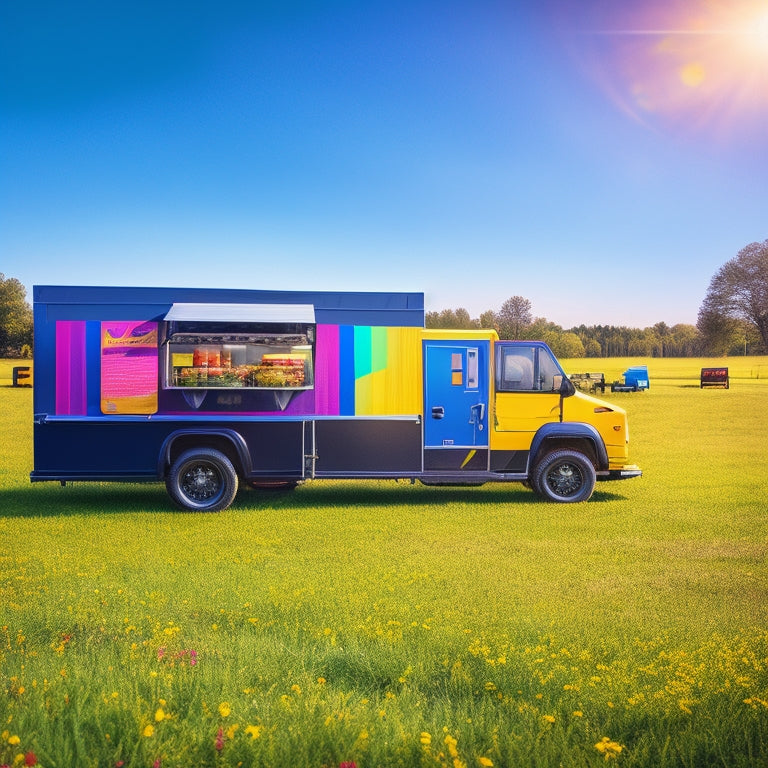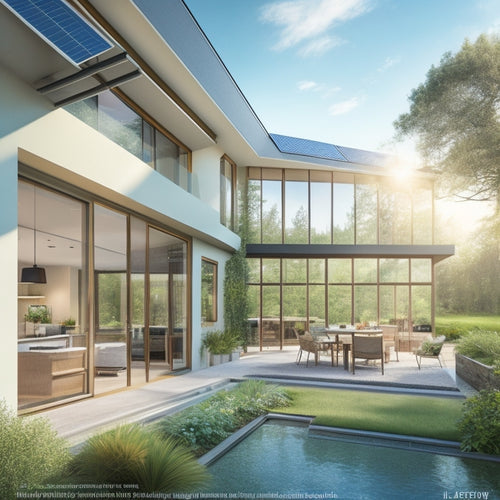
Top Off-Grid Solar Power Systems for Food Trucks
Share
You're looking to power your food truck with an off-grid solar power system, a cost-effective and environmentally friendly alternative to traditional fuel-based generators. Top solar panel brands for food trucks include Renogy, Zamp Solar, and HQST, each with their own warranties and performance guarantees. To choose the right system, consider your energy requirements, available roof space, and local solar irradiance. By installing an off-grid solar power system, you'll reduce your carbon footprint, operating costs, and reliance on fossil fuels, while increasing your business's sustainability and profitability. Now, explore the essential components and benefits of off-grid solar power systems to get started on the path to energy independence.
Key Takeaways
• Renogy, Zamp Solar, and HQST are top contenders for solar panels for food trucks, considering reputation, warranty, and performance.
• Off-grid power systems for food trucks require essential components, including solar panels, deep-cycle battery banks, power inverters, charge controllers, and monitoring systems.
• Solar power systems can reduce carbon footprint, operating costs, and reliance on fossil fuels, while increasing business sustainability, profitability, and environmental responsibility.
• To choose the right solar panel size, calculate energy requirements, consider available roof space, local solar irradiance, and energy efficiency to determine the ideal system size.
• Regular maintenance is crucial, including cleaning solar panels, inspecting wiring, monitoring battery health, and tracking energy production to ensure optimal system performance.
Top Solar Panel Brands for Food Trucks
When it comes to outfitting your food truck with a reliable off-grid solar power system, selecting a high-quality solar panel brand is vital, and top contenders like Renogy, Zamp Solar, and HQST offer efficient and durable solutions.
As you compare these brands, consider their reputation, warranty, and performance. Renogy, for instance, boasts a 25-year solar panel warranty, while Zamp Solar offers a 10-year warranty on its panels. HQST, on the other hand, provides a 10-year warranty on its solar panels and a 25-year performance warranty.
Brand reputation is also essential. Renogy, a well-established brand, has been in the industry for over 10 years, offering a wide range of solar panels. Zamp Solar, with its focus on off-grid systems, provides customized solutions for food trucks. HQST, a newer brand, has quickly gained popularity for its affordable and efficient solar panels.
Off-Grid Power System Components
Your off-grid solar power system for your food truck requires several critical components that work together seamlessly to provide reliable electricity. These components guarantee that your food truck's electrical systems function efficiently and safely.
The first essential component is the solar panel array, which converts sunlight into electrical energy. This energy is then stored in a deep-cycle battery bank, providing Energy Storage for your food truck's electrical needs.
The Power Inverters convert the stored DC power into usable AC power for your appliances and equipment. A charge controller regulates the energy flow from the solar panels to the battery bank, preventing overcharging or undercharging.
A monitoring system tracks the performance of your off-grid solar power system, providing real-time data to optimize its operation.
Finally, a safety disconnect and breaker box ensure safe and convenient access to the system's electrical components.
Benefits of Solar Power for Vendors
By harnessing the power of the sun, you can greatly reduce your food truck's carbon footprint and operating costs while increasing your business's sustainability and profitability. As a food truck vendor, you understand the importance of minimizing your environmental impact while maximizing your revenue. Solar power systems can help you achieve this goal.
By switching to solar, you'll not only reduce your reliance on fossil fuels but also decrease your energy expenses. This, in turn, will increase your profitability and allow you to invest in other areas of your business.
Additionally, solar power can increase your visibility as an environmentally responsible business. As consumers become more eco-conscious, they're likely to support vendors who share their values. By investing in solar power, you're demonstrating your commitment to environmental stewardship, which can lead to increased customer loyalty and positive word-of-mouth.
Choosing the Right Solar Panel Size
To guarantee that your off-grid solar power system meets your food truck's energy demands, you need to determine the ideal solar panel size, which depends on factors such as your energy requirements, available roof space, and local solar irradiance.
To calculate the required solar panel size, you'll need to perform a power calculation. This involves calculating your truck's total energy consumption, including appliances, lights, and refrigeration units.
You'll also need to take into account the energy efficiency of your system, as a more efficient system will necessitate smaller solar panels. By analyzing your energy requirements and available roof space, you can determine the most suitable solar panel size to ensure your system can generate enough power to meet your needs.
When selecting a solar panel size, take into consideration the local solar irradiance, which affects the panel's energy output. A larger panel may be required in areas with low solar irradiance.
Installation and Maintenance Tips
When installing an off-grid solar power system on your food truck, you'll want to guarantee a seamless integration that meets your energy needs. To achieve this, you'll need to take into account several key factors, including system design considerations, proper wiring and connection techniques, and ideal panel angle adjustments.
System Design Considerations
You'll need to carefully plan your off-grid solar power system's design to guarantee it can meet your food truck's energy demands, considering factors like battery capacity, solar panel size, and charge controller ratings.
Conducting load calculations is important to determine your energy requirements. Calculate the total watt-hours (Wh) needed to power your appliances, lights, and other equipment. This will help you select the right battery capacity and solar panel size.
Prioritizing energy efficiency is vital to minimize energy waste and reduce your system's overall size. Look for energy-efficient appliances and LED lighting to decrease your energy demands.
A well-designed system will ensure you have a reliable source of power while minimizing costs and environmental impact. Remember, a properly sized system will also reduce the risk of electrical shock, fire hazards, and equipment damage.
Wiring and Connection Tips
Properly connecting and wiring your off-grid solar power system is crucial to guarantee efficient energy flow and prevent electrical hazards. As you install your system, keep in mind that incorrect connections can lead to voltage drops, overheating, and even electrical fires.
To guarantee a safe and efficient system, follow these wiring and connection tips:
- Use the correct gauge wire: Ensure your wire gauge can handle the maximum current output of your solar panels to minimize voltage drops.
- Implement circuit protection: Install circuit breakers or fuses to protect your system from overcurrent and short circuits.
- Secure connections: Use waterproof connectors and secure cables to prevent water ingress and physical damage.
- Label and organize cables: Clearly label and organize your cables to prevent confusion and ensure easy maintenance.
Panel Angle Optimization
Optimizing your solar panel angle is crucial to maximize energy harvesting, as even a slight deviation from the ideal angle can greatly reduce system performance. As a food truck owner, you'll want to make sure your solar panels are positioned to capture the most sunlight possible. To achieve this, you'll need to make seasonal adjustments to your panel angle.
During the summer months, you'll want to tilt your panels at a steeper angle to capture the sun's higher rays. In the winter, a more shallow angle will allow your panels to soak up the sun's lower rays. Additionally, perform a shading analysis to identify any potential obstructions that may impact your system's performance. This includes trees, buildings, and even your food truck's own equipment.
Overcoming Common Solar Power Challenges
When integrating an off-grid solar power system into your food truck, you'll inevitably encounter challenges that can affect the system's performance and overall reliability. To guarantee a seamless operation, it's imperative to address these common solar power challenges head-on.
Some of the most critical issues to tackle include:
-
Shading Mitigation: Shading can greatly reduce your system's energy output. Ensure your panels are installed at an ideal angle and consider using shading mitigation strategies, such as trimming nearby trees or using shading-resistant panels.
-
Battery Degradation: Battery health is vital for your off-grid solar power system. Monitor your battery's state of charge, depth of discharge, and charging cycles to prevent degradation and extend its lifespan.
-
Inverter Failure: Inverters can be prone to overheating or malfunctioning. Regularly inspect and maintain your inverter to prevent downtime and ensure a stable power supply.
- Electrical Overloads: Overloads can lead to system failures or even electrical fires. Ensure your system is designed to handle peak power demands, and consider installing overcurrent protection devices for added safety.
Frequently Asked Questions
Can I Use Solar Power for Food Truck Refrigeration Units?
Like a beacon in the dark, solar power can illuminate your refrigeration needs. You can harness solar energy to power your food truck's refrigeration units, ensuring energy efficiency and peak cooling capacity, while keeping your food and drinks pleasantly cool.
How Long Do Solar Panels Last on a Food Truck?
You can expect solar panels on your food truck to last around 25-30 years, but proper panel maintenance and energy efficiency practices are essential to guarantee top performance and extend their lifespan.
Will Solar Panels Affect My Food Truck's Insurance Rates?
You won't necessarily see a direct impact on your insurance rates from installing solar panels, but you might be eligible for insurance discounts if you can demonstrate improved safety features, and policy changes may be necessary to guarantee adequate coverage.
Can I Expand My Solar Power System in the Future?
You can easily expand your solar power system in the future by adding more panels or upgrading components, ensuring System Upgrades that maintain Energy Efficiency and safety standards, without compromising your food truck's operations.
Are Solar Panels Durable Enough for Frequent Travel?
You'll be relieved to know that solar panels are built to withstand harsh road conditions and extreme weather resistance, ensuring they can handle frequent travel without compromising performance or safety.
Related Posts
-

5 Efficient Air Circulation Methods for Green Homes
You can utilize the power of natural ventilation techniques, whole house fans, and solar-powered ventilation systems ...
-

What Water-Saving Gardens Complement Electric Vehicle Ownership?
As you pair your electric vehicle with a water-saving garden, you're not only reducing your carbon footprint but also...
-

10 Powerful Electric Mowers for Expansive Lawns
You're moving away from gas-powered mowers and exploring electric options for your expansive lawn. You'll find that h...


